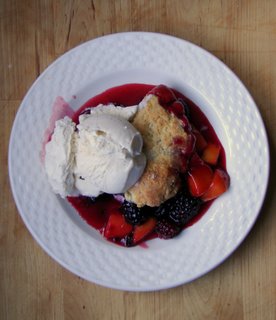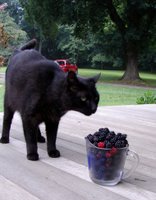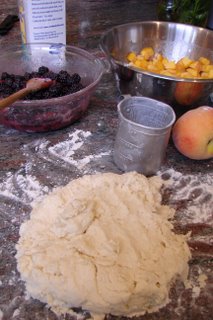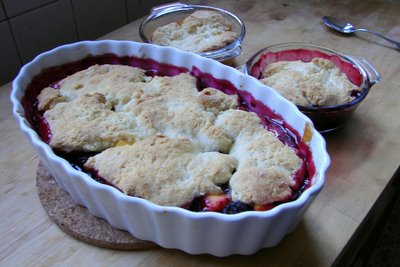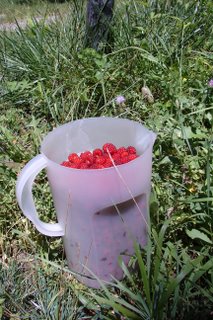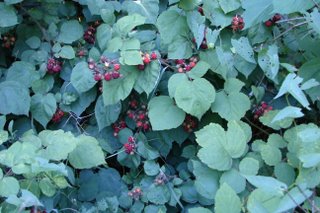Weary Blues From Waiting, Part I
 Look at this guy. His idea of a good time is to set up a chair and a cooler next to his car, fire up some mellow R&B on the car stereo, and watch other people have a party. Really! he described his perch there as “the best spot in the park,” and I was eaten up with envy -- not of the patch of ground he'd claimed, but of his enthusiasm for spectatorship. As you can see, I had visual access to the same scene; had I been as entertained by it as he was, the five hours of waiting I endured that Sunday would have been far less painful. Perhaps the ennui would have been relieved by my iPod Shuffle, my Peterson's Field Guide to Edible Plants of Eastern and Central North America, my recently acquired (and first) cell phone, or the novel I had been reading, but they were all locked in my car with my keys.
Look at this guy. His idea of a good time is to set up a chair and a cooler next to his car, fire up some mellow R&B on the car stereo, and watch other people have a party. Really! he described his perch there as “the best spot in the park,” and I was eaten up with envy -- not of the patch of ground he'd claimed, but of his enthusiasm for spectatorship. As you can see, I had visual access to the same scene; had I been as entertained by it as he was, the five hours of waiting I endured that Sunday would have been far less painful. Perhaps the ennui would have been relieved by my iPod Shuffle, my Peterson's Field Guide to Edible Plants of Eastern and Central North America, my recently acquired (and first) cell phone, or the novel I had been reading, but they were all locked in my car with my keys.Cruising along a Fairmount Park drive that dead-ends at a locked back entrance to a botanical garden, I had spied what I was seeking: a wild cherry. “Play that funky music!” I shouted in triumph as I halted abruptly on the drive's generous shoulder. I put the car in park, pulled the keys out of the ignition, hastily grabbed my camera and a brown paper bag, and bounded out of the car with a buoyant enthusiasm that was almost immediately deflated when I realized that my key chain, a custodian-sized D-ring that I keep neglecting to prune of the souvenirs of cars and apartments past, was not jangling along with me. I peered through the window and my keys mocked me from the passenger seat with a toothy metallic grin. Panicked, I tried the door from which I'd just emerged – no go. I could see that the passenger door was locked as well. A brief flow er of hope bloomed and died in my breast as I tried and failed to open the hatchback.
er of hope bloomed and died in my breast as I tried and failed to open the hatchback.
I sighed and mentally ripped my to-do list into a thousand pieces as I began trudging through a lightly wooded stretch of park toward a ruckus that sounded human in origin; I, with nothing on me but a camera, an empty paper bag and three crumpled dollar bills, needed to forage for some help. I emerged from the woods onto a parking lot beside a public swimming pool that was, on this hottest-yet day of the summer, aswarm with activity. I spotted a likely couple seated in lawn chairs beneath a magisterial pine just outside the gates of the pool.
Twana and Howard were not, I later learned, a couple – just old friends whose variously aged children were enjoying an aquatic afternoon, more or less together. They both responded to my appeal with the utmost sympathy. Twana handed me her cell phone. I confessed that I wasn't even sure whom to call, and Howard advised me to call 911. I hesitated for a moment, a bit sheepish about characterizing my situation as an emergency while heinous crimes were no doubt being committed all over Philadelphia.
“Do you want me to call?” Howard asked, and I handed him the phone, relieved, though embarrassed by my passivity. He dialed 911 and said, “This is Officer -----”
Twana laughed at my gaping mouth. “Is this your lucky day or what?”
Howard continued to the 911 dispatcher, “I've locked my keys in my car. Can you put out a call to officers in the area to request assistance with a slim jim?”
Such generosity! This man, a stranger to me, was willing to portray himself as the sort of stumblebum who would lock his keys in his car – the sort of stumblebum I am – in order to speed the police response to my call.
After some time, a uniformed officer arrived in a marked car. But the blossom of hope was once again crushed when he explained that he was there for another reason, some business in the lifeguard shack. He had heard Howard's call, he said, but none of the officers on duty that day
Twana again offered me her phone, for a call to Triple A. The electronic misadventures that followed should by all rights have put an enormous strain on her trust, but she never betrayed an iota of suspicion -- or even irritation -- as I drained her phone of minutes and disappeared from sight.
On my first attempt, I could barely hear a word. “Speak up! Speak up!” I shouted at the disembodied electronic voice that recited the menu of choices, while I frantically stabbed at an up-pointing arrow that I took for a volume control. “I can't hear a damn thing!” It was frustrating to know that there was zero chance of my request's being understood by the machine on the other end; on the other hand, there was no reason to feel guilty about my peremptory tone of voice. Pressing my thumb against my unoccupied ear, I moved away from the pool and its high-spirited, reverberating clamor.
In this situation, making choices from the menu was more or less like throwing darts blindfolded, and I missed, landing in a queue of callers who were waiting to make vacation plans. I hung up and dialed information again. Midway through that call, I realized that the voice on the other end became perfectly audible if I simply placed the little speaker close to my ear. Aha! Now telecommunication was happening! Having only recently acquired my first cell phone, I'm not especially adept at the technology.
Now the holding began. I held and held and held that day – surely the Triple A has never encountered a more tenacious grip than mine. When I finally reached a human voice, I didn't have my membership number, of course: the wallet with the membership card was locked in the car with everything else. But they were able to find my records using my name and address, and we began to attack the problem of fixing my location. To anyone familiar with the streets of Philadelphia – such as, for instance, any emergency-service driver who works here – my location was easy to identify: the Kelly Pool, behind Memorial Hall. Any Philadelphian knows where Memorial Hall is. But the Triple A dispatcher was not a Philadelphian, nor was her software. She needed the name of a street and a cross street. A street sign some distance away was oriented at a skew angle that would require me to walk right up to it in order to be able to read it.
I was already several yards from Twana and Howard. Twana's cell phone was, of course, cordless, but I nevertheless felt it as a tether: I didn't want them to worry that I was just wandering off with it, especially in view of the fact that Howard was a law-enforcement officer. But what was I to do? The point from which I was able to read the sign was about 175 yards (.0987 miles) away from their spot under the pine tree, as calculated by the Gmaps Pedometer. I started walking, and no one came running after me.
The dispatcher fed my location into her computer, and another period of holding ensued. I returned to the little haven under the tree, where Howard was now affectionately toweling off a handsome, long-lashed five-year-old boy of rather solemn demeanor, and planted myself in the armchair created by a couple of massive roots. Finally the dispatcher came back on the line, only to fade into nothingness. I had exhausted the phone's power supply.
“I'm so sorry!” I cried, but Twana appeared unperturbed. She said, “Howard, where's yours?” and Howard produced his cell phone from his car. Another try, more holding. At last I got confirmation that a service truck had been sent and should arrive within an hour and a half.
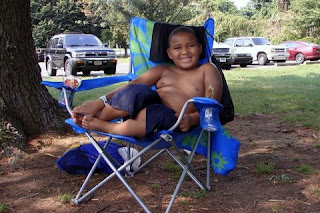
At nine years old, I'd loved June better than Christmas. June meant the fresh awareness, upon waking each morning, of freedom. The honeysuckle of June, the mown grass, the hot asphalt, the lighter fluid and charcoal smoke, the beer and citronella candles and end-of-the-day sweat, these were the odors of freedom. I'd savored them most each year when they were new. But summer's deepest perfumes were those I didn't notice, the ones that permeated my olfactory environment when freedom from the classroom seemed natural, unremarkable, routine. Once they rose to consciousness, they triggered anticipatory nostalgia.
One of those odors arose from chlorine compounds. How long has it been since I was in a swimming pool, especially an outdoor pool? I used to spend at least eight hours a day at oa pool, every summer of my adolescence but one, teaching swimming and lifeguarding. I was a tower of strength up there on the lifeguard stand, the protector of hapless children from the voracious turquoise god of the Deep End, and mostly unaware of my own glamor. Who really marked, then, how evenly the sun distributed pigment across one's supple young pelt, painting it a uniform golden hue with none of the troublesome blotchy concentrations that nowadays dredge up unwelcome words like “melanoma” from one's idle vocabulary?
Blogger's note: I began writing this entry immediately after the (non)events described took place. I faltered when I realized that I had racked up 1,700 words without having reached even the first of two Triple A guys, let alone the fruit I harvested and the jelly I made from it. Two years later, I haven't gotten around to finishing it, so I've decided that I'll just post what I've got. Perhaps I'll be motivated to write through to the end of the story someday, but trust me: what followed was nothing to write home about.
Labels: boredom, car trouble, cell phones, communications technology, kindness of strangers, nostalgia, Philadelphia, summer, swimming pools, wild cherries



